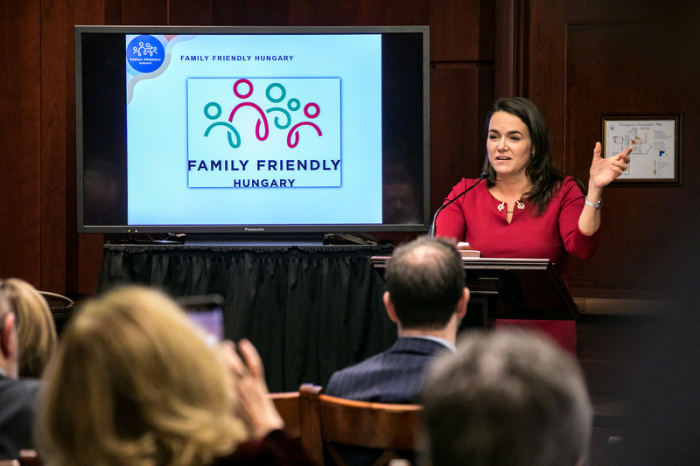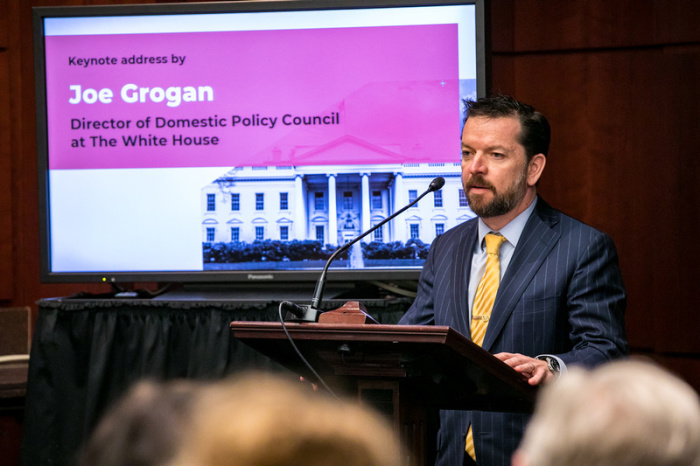Hungary, Brazil and US talk declining birth rates, abortion at Capitol Hill conference

WASHINGTON — Government officials from Hungary, Brazil, Poland, and the United States gathered with social conservatives on Capitol Hill Wednesday to discuss policies that promote the growth of nuclear families as fertility rates in the West flounder below replacement levels.
The second International Conference on Family Policy was hosted by the Hungarian Embassy in partnership with the Embassy of Brazil and the U.S. Department of Health and Human Services.
The conference, held at the U.S. Capitol Visitor Center, comes months after the first conference was hosted by the Hungarian Embassy in Washington in which Hungarian officials from President Viktor Orbán’s national-conservative Fidesz Party discussed the progress the country has made in recent years, thanks to policies that have incentivized married couples to have more children.
While some European countries have responded to their declining populations by looking to mass immigration to aid their low numbers, the Hungarian government has taken a different approach and is rebuilding its population through the procreation of the Hungarian people. The government has adopted the motto of Hungary being “family-friendly.”
“We believe that strong family policy makes the country stronger and the nation stronger,” Hungary's Ambassador to the U.S., László Szabó, said in his introductory remarks.
“When we are talking about nations, we are not talking about The Washington Post version of nationalism. We are talking about loving your country and making your country more successful.”
Hungary’s pro-family policies have become of a model for other countries looking to incentivize family growth.
In Hungary, some parents are eligible to receive loans of up to $35,000 to help them pay for such things as a home mortgage. And those loans can be forgiven if families have three children or more.
Hungary’s list of incentives and benefits for parents also includes a state-funded day care system, three years of paid parental leave, free kindergarten, and subsidized vacations.
Beginning in January 2020, mothers with four children or more will also receive an exemption from paying income taxes.
Since the Orbán government took power in 2010, Hungary has seen an increase in its marriage and fertility rates and a decrease in divorce and abortion rates.
“Once you don't have this security of being able to count on these family subsidies, then maybe you'll give up on having children,” Katalin Novák, minister of state for family and youth affairs and vice-chair of the ruling Fidesz Party, said in her keynote remarks.
“And that's actually what happened in Hungary. And that is what is happening in Europe and other parts of the world. More and more, young people just give up on having children.”
Novák said there is not a single European Union member state where the fertility rate reaches two children per woman. The replacement level fertility rate is 2.1.
“So there is not a single European member state where there are enough children born in order to even maintain the population. I think this is very alarming,” she said. “And that goes for the United States as well. In the United States, you have quite a nice fertility rate, I mean, compared to the average part of the world, but it doesn't reach to [replacement level] either.”
Novák noted that Hungary’s population has declined by nearly 10 percent since 1981. In 2011, she said, the fertility rate reached a low point of 1.23 and increased to 1.53 in 2017.
She said that young people naturally want to have children and the government wants to “enable” them to do so.
Another aspect of Hungary’s family policies, Novák said, is the value the government places on the life of the unborn and the importance of a nuclear family anchored by having one mother and one father.
The new Hungarian Constitution enacted in 2011 states that “embryonic and fetal life shall be subject to protection from the moment of conception,” she said. The Constitution calls for Hungary to “protect the institution of marriage as the union of a man and a woman established by voluntary decision, and the family as the basis of the nation’s survival,” she added.
Although Hungary struggled to gain allies on the world stage in the early years of the Orbán administration, Hungary’s pro-family policies have received praise from social conservatives worldwide and like-minded governments as conservative parties rose to power in the U.S. (2017) and Brazil (2018).
Some of Hungary’s ideas have even influenced family policies in Poland (ruled by the national-conservative Law and Justice Party) and the Czech Republic, Novák told The Christian Post.
“Now we have more and more allies and we are happy for Poland, we are happy for Brazil, and of course we are happy for the U.S.,” Novák said. “We are not alone fighting this battle.”
Joe Grogan, director of the family policy council for the Trump administration, praised Hungary for its leadership.

“[Hungary’s] leadership needs to be recognized on these issues because we don’t just come here in support and solidarity on their issues, we are inspired by the courage and creativity you bring to these policies,” he told the audience.
“The Trump administration has been supporting America’s families from before he took office, on the campaign trail. He has spoken often about pro-family policies and wants America to be the best place to work and raise a family in the world.”
Grogan also touted the successes in the economy and job market, which he said are “essential” to having strong families.
“[Over] 6.7 million jobs have been created under [President Donald Trump’s] leadership,” he said. “Unemployment is at the lowest level in half a century — 3.6 percent as of October. We have hit record [low] unemployment for African Americans, Hispanic Americans, and Asian Americans, women, and veterans.”
However, Grogan stressed that the growing workforce strains the child care system.
“We need to make sure we have access to affordable high-quality child care and paid family leave,” he said. “It has become even more important to our economy and to working families.”
Grogan said that in 28 states, the average cost of center-based infant care is more than college tuition.
“That is why President Trump signed into law the largest ever increase for the Child Care and Development Block Grant, an increase of nearly $2.4 million,” Grogan said. “President Trump also signed the Tax Cuts and Jobs Act of 2017, where we doubled the child tax credit to $2,000. This tax credit offers real relief for America’s moms and dads.”
Grogan stressed that policies like those are “important” for working families.
“We hear often from people across America about how important this child tax credit is,” Grogan said. “A number of White House staff returning from Thanksgiving break mentioned to me that this was the No. 1 thing they heard about and thanked the president for doing and how important it was for their families.”
In his fiscal year 2020 budget, Trump has proposed a one-time $1 billion incentive fund designed to “build a supply of child care and stimulate employer investment in child care,” Grogan added.
“All parents should have the freedom in deciding how to raise their children,” he said. “Deciding how to balance work and family is a personal choice and this administration is focused on supporting both working and stay-at-home parents.”
Grogan contended, however, that the federal government should not be the primary focus for relief on this issue.
“States and localities control most of the child care regulations in this country and they must focus on improving access and affordability by focusing on deregulation and ensuring that underserved communities are receiving the help they need,” Grogan said.
“Speaking from my own experience with having four kids, the first three had the benefit of a child care facility in my neighborhood — a place run by a wonderful woman for 30 years,” he said. But “she was regulated out of business here in the District of Columbia.”
Grogan said the administration has heard from several faith-based institutions nationwide who say they are getting regulated out of child care service.
“These excessive regulations on child care have a real impact,” he said. “We are not saying there shouldn’t be regulation, but they need to be balanced with the fact that child care access is important. Parents are primary deciders of what is good child care for their own kids.”
According to Grogan, a coalition of broad support for paid family leave has been built up over the last three years through meetings with members of Congress on both sides of the aisle, private sector companies, and thought leaders.
Next week, the White House will host a summit on child care and paid family leave.
“[Trump] is the first president to include a paid family leave program in his budget,” Grogan said. “This is a bipartisan issue and we look forward to working with both sides of the aisle to establish a paid parental leave plan for America’s parents.”
Grogan also praised the Trump administration’s policies protecting “the life of the unborn.”
“President Trump has made protecting the lives of the unborn a cornerstone of his policy agenda,” Grogan said. “Among his many achievements, he has restricted the use of fetal tissue for federally funded research, and published a regulation that prevents the mixing of taxpayer funding for Title X family planning program with projects that promote or refer abortion as a method of family planning.”
Novák, who is also vice-chair of the ruling Fidesz Party, told CP that it's very important to have more members of the Trump administration who are paying attention to what they are doing in Hungary.
“We see how different it is with the Trump administration right now than it used to be,” she said. “We all the time faced the anti-family values being represented by the former U.S. governments at international fora. The U.S. is playing a key role in many international organizations on pro-family and pro-life issues.”
“We were alone,” she added. “We were so lonely. We sometimes just felt so desperate because we were fighting this battle with no potential allies. But then some countries also joined: Poland, Brazil, the U.S.; Italy for a while was also a partner but not anymore. The V4 countries are more and more family-friendly. We have some allies in Baltic countries as well.”
Maryland Republican Rep. Andy Harris also spoke at the conference and said that the realization has come in Western nations that “civilizations actually can become extinct.”
“Mathematically you can. You just don’t have to have an adequate replacement,” Harris said.
“There is a growing realization among western nations that there have been myths propagated over the years. The myth, for instance, that overpopulation is the result of a birth rate. It’s not true. I am a physician. These graphs that present overpopulation is not because we have too many births, it is that people have now stay healthier and live longer because we deliver better medical care.”
“What we have allowed to happen in the United States, as well as many other nations, is allow the birth rate to fall below replacement birth rate,” Harris added. “In the U.S. our population continues to grow not because our birth rate is above the replacement birth rate, it is because we accept 1 million immigrants a year.”
Harris stressed the U.S. has to adopt policies that encourage a replacement birth rate and encourage growth to preserve its “culture of civilization.”
He criticized social welfare policies that discourage nuclear families or the “presence of a man in the family.”
“Our Housing Secretary Ben Carson asked, ‘Why would we have a policy in providing housing that says that if you get married you can lose your housing benefit?’ Harris recalled. “If what we are doing is discouraging a nuclear family, we are not doing our civilization or our culture any benefit at all.”
Follow Samuel Smith on Twitter: @IamSamSmith
or Facebook: SamuelSmithCP




























